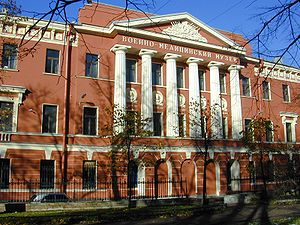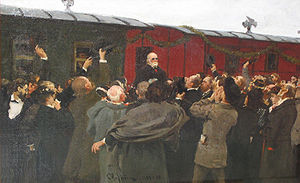
Museum of Military Medicine
Encyclopedia

Saint Petersburg
Saint Petersburg is a city and a federal subject of Russia located on the Neva River at the head of the Gulf of Finland on the Baltic Sea...
, Russia
Russia
Russia or , officially known as both Russia and the Russian Federation , is a country in northern Eurasia. It is a federal semi-presidential republic, comprising 83 federal subjects...
, in front of Vitebsky Rail Terminal.
History
The Museum was founded in 1942. Its initial creation was based on collections from several small specialized Russian museums. Today, the museum holds about 210,000 exhibits relating to the history of Russian and world military medicineMilitary medicine
The term military medicine has a number of potential connotations. It may mean:*A medical specialty, specifically a branch of occupational medicine attending to the medical risks and needs of soldiers, sailors and other service members...
.
The exhibits include rare old books, such as the treatise of Ambroise Paré
Ambroise Paré
Ambroise Paré was a French surgeon. He was the great official royal surgeon for kings Henry II, Francis II, Charles IX and Henry III and is considered as one of the fathers of surgery and modern forensic pathology. He was a leader in surgical techniques and battlefield medicine, especially the...
, the famous French surgeon of the 16th century, published in Paris in 1607. There are also some documents pertinent to the State of Russia, e.g. The Arrangement of the Military Service in the Russian Army, which dates from 1706 and is the edict of the Russian Emperor Peter I of Russia
Peter I of Russia
Peter the Great, Peter I or Pyotr Alexeyevich Romanov Dates indicated by the letters "O.S." are Old Style. All other dates in this article are New Style. ruled the Tsardom of Russia and later the Russian Empire from until his death, jointly ruling before 1696 with his half-brother, Ivan V...
. Also, of unique interest in the collection are the works of art. Some of the more noteworthy works of art include a sketch by the famous Russian painter Ilya Repin of The arrival of Nikolai Ivanovich Pirogov to Moscow celebrating the 50th anniversary of his scientific activities in 1881.

There is also displayed a historical collection of surgical instruments
Surgical instruments
A surgical instrument is a specially designed tool or device for performing specific actions of carrying out desired effects during a surgery or operation, such as modifying biological tissue, or to provide access for viewing it. Over time, many different kinds of surgical instruments and tools...
which dates back centuries.
Another important part of the museum is its archives of military medical documents. These archives hold more than 60 million items. Included are the medical charts of all wounded and ill military servicemen beginning with World War II
World War II
World War II, or the Second World War , was a global conflict lasting from 1939 to 1945, involving most of the world's nations—including all of the great powers—eventually forming two opposing military alliances: the Allies and the Axis...
and continuing through all subsequent wars or local military conflicts. Thanks to the archives, the museum archivists were able to collect data directly from one million original documents to support records in the Commemoration Book, which provides a record of the people of Russia who perished during World War II. In addition, the archives contain about 500,000 medical records of foreign citizens from 45 countries.
Responding to inquiries from foreign governments, the museum located the documents of more than 100,000 people who were listed in their respective countries as missing in action.
The museum researchers carry out extensive analysis of military medical practices from all wars and other conflicts, both the past to the present, in order to improve the outcomes of medical aid. Although no matter how much improvement is made in medical care, one fact still remains clear: the monster of military destruction always overtakes and surpasses the angel of medicine.
Moreover, the history of medicine reveals an even more ominous trend, which is the tendency toward the progressive dehumanization of medicine itself. Two hundred years ago, during the French-Russian
Napoleonic Wars
The Napoleonic Wars were a series of wars declared against Napoleon's French Empire by opposing coalitions that ran from 1803 to 1815. As a continuation of the wars sparked by the French Revolution of 1789, they revolutionised European armies and played out on an unprecedented scale, mainly due to...
wars, military doctors impartially treated both their own soldiers and the soldiers of the enemy. The Russian military doctor, Christophor Oppel, was awarded for his service on the battlefield by both the Emperors Alexander I of Russia
Alexander I of Russia
Alexander I of Russia , served as Emperor of Russia from 23 March 1801 to 1 December 1825 and the first Russian King of Poland from 1815 to 1825. He was also the first Russian Grand Duke of Finland and Lithuania....
and Napoleon I of France
Napoleon I of France
Napoleon Bonaparte was a French military and political leader during the latter stages of the French Revolution.As Napoleon I, he was Emperor of the French from 1804 to 1815...
at the same time! Now, 200 years later, at the beginning of the 21st century, military doctors participate in interrogation of the enemy with the intention of securing critical information with the aid of medicines. Furthermore, there exist some attempts to scientifically substantiate it, contending that the interests of the nation and government are superior to the interest of an individual (see e.g.). Hence, the implicit and definite civil super-task of the museum is the appeal to societies and governments to promote the use of medicine strictly for the benefit of humanity and not to create any conditions that might promote harm or conflict.
Literature
- Budko A.A., Bergman M.D. (Будко А.А., Бергман М.Д. ) The Fundamentals of the Conception of the Military Medicine Museum // The Military Medicine Journal (Voenno-Meditsinski Zhurnal - Военно-медицинский журнал, in Russian), 2007, Vol. 328, No 6 (June 2007), pp. 80 - 84.
- Budko A.A., Ivanova L.D. (Будко А.А., Иванова Л.Д.) The Military Medicine Museum is the Principal Guardian of the Historical Traditions of the Russian Medicine and Its Military Medical Service // Asclepius (Асклепий, in Russian), 2005, Vol. 8, No 1, pp. 46 - 57.

